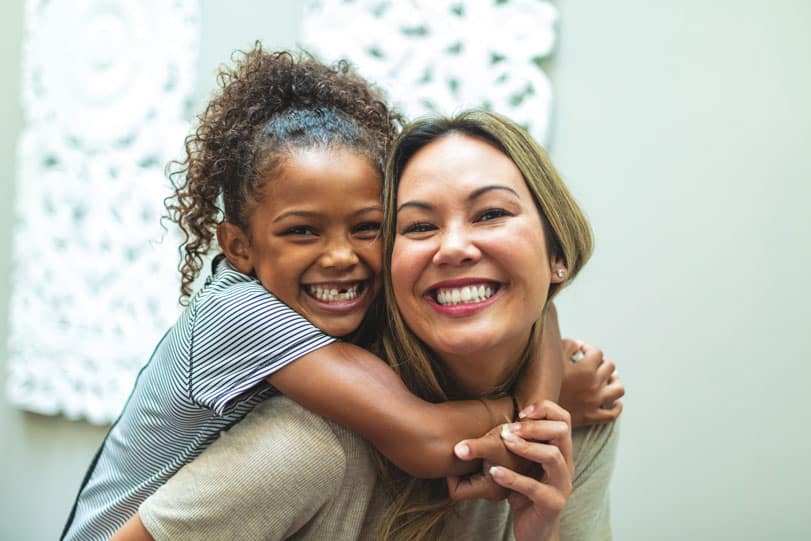May is Mental Health Awareness month! For 2021, the theme is “You Are Not Alone,” as chosen by the National Alliance on Mental Illness (NAMI). Mental health disorders can feel so isolating, and family support can make all the difference to children who are struggling.
Read on to find out why talking about children’s mental health is so crucial. Then, discover a few strategies for building good mental health habits as a family, as well as how to reach out to professionals for more support.
Why Discussing Children’s Mental Health Matters
 Statistics show that mental health issues in young children are more common than you may think. The top five most common childhood disorders are now mental health conditions rather than physical disorders.[1] In fact, as many as 10% of all children and young adults have mental health conditions that affect their day-to-day routines.[2]
Statistics show that mental health issues in young children are more common than you may think. The top five most common childhood disorders are now mental health conditions rather than physical disorders.[1] In fact, as many as 10% of all children and young adults have mental health conditions that affect their day-to-day routines.[2]
What does this mean? A few factors could be coming into play here, like more awareness of mental illness and more people seeking diagnosis and treatment. But the bottom line is you likely know a child who struggles with their mental health, and how you react can help them.
In one survey, children said their family and friends were their most important emotional supports.[3] That means you can offer emotional support and guidance that your child trusts. And because experts predict that children are likely to have both immediate and long-term emotional trauma caused by the COVID-19 pandemic, now is a crucial time to focus on mental health for your family.[4]
7 Ways to Nurture Your Family’s Mental Health
When it comes to kids and mental health, family support can go a long way. These seven tips will help you understand your family’s emotional health and know what to do when your child is struggling.
1. Talk about mental health with your child.
The first step to nurturing your child’s mental health is discussing the topic openly. That way, they know that mental health is an important part of their overall well-being and that emotional struggles are nothing to be ashamed of.
For a simple but meaningful way to bring mental health topics into your home, see if your library has these children’s books about mental health:
- In My Heart: A Book of Feelings by Jo Witek and Christine Roussey
- Listening to My Body by Gabi Garcia and Ying Hui Tan
- The Princess and the Fog by Lloyd Jones
- Pilar’s Worries by Victoria M. Sanchez and Jess Golden
- Anxious Charlie to the Rescue by Terry Milne
2. Listen to and empathize with your child’s experiences.
The Mental Health Foundation notes that when you listen and empathize, it can help children feel less alone. When your child is feeling overwhelmed, instead of trying to fix the problem, just sit with them in that feeling and let them know that they have your support.
3. Encourage your child to communicate about their feelings.
Listening is essential, but your child has to be comfortable communicating with you in the first place. Let your child know that no matter what they are going through, they can always talk to you about it. Make an effort to discuss their thoughts and feelings often so when they’re struggling, they know they can tell you and feel supported.
Not sure where to start? Mental Health America offers a resource on mental health conversation starters for kids and teens focused on:
- Observations
- Personal experiences
- Mental health information from professionals
To help children feel comfortable talking about their feelings, you could also encourage them to start with a sentence that begins with “I,” like “I feel…” or “I want…”. That way, your child knows you are interested in better understanding their emotions.
4. Build a relationship of trust with your child.
According to psychotherapist Amy Morin in an article with VeryWell Family, children thrive emotionally when they feel safe and secure. You can help them feel safe by building trust. Little actions, like following through on what you say you will do, and big actions, like taking care of their needs, will help you have a trusting relationship.
5. Create a family routine.
Daily routines can also help children feel secure and grounded during times of uncertainty or stress. The American Academy of Pediatrics recommends activities like reading together, having meals at the same time, or sharing how your day went together to build a home routine.
6. Be a self-care role model.
Self-care is important for everyone in your family—children included. Taking care of yourself can help you stay well enough to tackle your own responsibilities and work through stress.
If your child feels overwhelmed, help them find ways to nurture their emotional and physical health. Try to pinpoint areas where they’re not taking care of themself and address them as best you can. If they’re having trouble falling asleep, for example, you can help them find ways to get more rest at night.
7. Reach out for professional help as needed.
If your child is struggling with their mental health, you may not be able to do it all yourself. Keep your primary care provider updated on your family’s mental health, and let them know if anything changes. They may be able to provide some mental health care and find specialists if your child needs more support.
According to the National Institute of Mental Health, these and other warning signs listed here could indicate that your child needs professional support:
- Frequent tantrums or irritability
- Loss of interest in activities they enjoy
- Recent decline in grades
- Withdrawal from friends and families
- Behaviors that hurt themselves or others
Remember: it says nothing about you as a parent if your child has a mental health issue that needs professional help. Just like you need a doctor to set a broken bone or a dentist to fill a cavity, doctors, counselors, and other pediatric mental health professionals can help your child recover.
Sources:
- Slomski, A. Chronic Mental Health Issues in Children Now Loom Larger Than Physical Problems. Journal of the American Medical Association, 2012, 308(3), pp. 223-225.
- Membride, H. Mental health: early intervention and prevention in children and young people. British Journal of Nursing, 25(10), pp. 556-557.
- Coverdale, G.E., and Long, A.F. Emotional wellbeing and mental health: an exploration into health promotion in young people and families. Perspectives in Public Health, January 2015, 135(1), pp. 27-36.
- Panchal, N., Kamal, R., Cox, C., and Garfield, R. The Implications of COVID-19 for Mental Health and Substance Use. Henry J. Kaiser Family Foundation (KFF). February 2021. https://www.kff.org/coronavirus-covid-19/issue-brief/the-implications-of-covid-19-for-mental-health-and-substance-use/.

